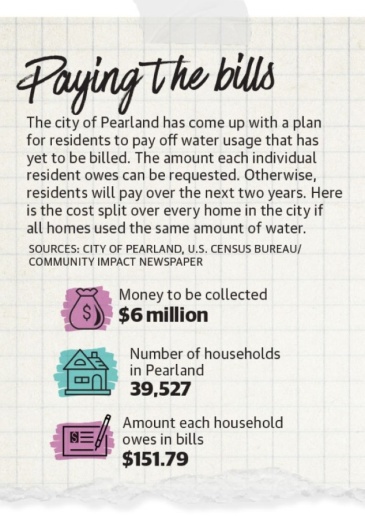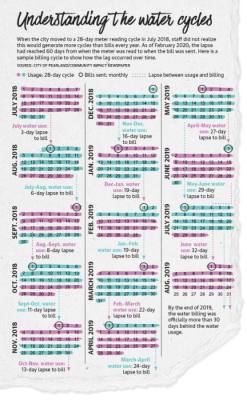Since mid-2018, water meters had been read every 28 days and bills sent out once a month, creating a gap between the reading and billing cycle. By only reading meters every 28 days, meters were being read faster than bills were being sent out. Over time, the gap between the meter readings and the bills had grown so large, it had reached a 60-day discrepancy. This was the gap once it was brought before the public in February. As a result, the city of Pearland still needs to collect $6 million in payments.
"It’s an accrual of water that has not been billed,” City Manager Clay Pearson said. “That’s not money that is lost.”
A new plan to regulate the city’s water billing system was approved in April. This wraps up the policy issue presented publicly in February, but the consequences of the error continue in the eyes of residents.
“It’s a loss of faith,” Pearland resident Denise Hewitt said.
Rather than reading bills every 28 days, the 32/30 plan approved in April reads them every 32 and will bill every 30. By this plan, the city expects to collect the $6 million by early 2023.
How the gap was created
In July 2018, the city realized due to the manual component of reading water meters, it was often taking longer than industry standards to read customers’ meters, Pearson said. The city had received several customer complaints about billing as well. The utility billing department was given the directive by city management to get the read time closer to 30 days, and the 28-day read cycle was subsequently born.
Industry standards require meters to be read every 28-32 days for billing, according to city staff. As the meters had a manual component, which required people to go out and read them manually and report the numbers, there were times meters were read closer to every 40 days, Pearson said.
“It was a function of the manual piece of [the system],” he said. “It’s more susceptible to staffing and holidays.”
The new system read meters every 28 days and billed once a month, according to city staff. Over the next two years, city staff was unaware this system was creating a larger gap, staff said. The problem was addressed publicly, for the first time, in February when roughly 25% of the city received two bills in one month. The new system was still sending out bills monthly; however, with the new read cycle, meters would be read 13 times a year.
“It was confusing to people, and it shouldn’t have occurred,” Deputy City Manager Jon Branson said.
Branson, who oversaw the utility billing system as part of his role as Deputy City Manager, has since announced his retirement, as did the director of finance at the time, Cynthia Pearson, according to a city document.
The city’s next steps
The Olson & Olson report stated: “The main reason the billing gap was not recognized and corrected in a timely fashion was because the city failed to have any policies, procedures or practices in place designed to monitor and address the potential disparities between the meter-read dates and billing dates.”
Clay Pearson believes adjusting the system to the 32/30 standard will address the policy issues.
“In an ideal world, things work as they are meant to all the time. In the next best world, there will be better awareness when there is an issue, and that is both on us and on the software,” Clay Pearson said.
The report also stated the utility billing department is understaffed and overworked and there is low morale in the department. This is something Council Member Trent Perez plans to address at budget talks this summer.
“We’ve actually tasked our staff to solicit a consultant to come and see what we’re missing,” Perez said.
The consultant would be hired through a request for proposal that council is set to vote on in late June.
Council members have also said this has resulted in a lack of trust.
“We have to repair the broken system but we also have to repair the broken trust,” Council Member Luke Orlando said.
Some residents have mentioned wanting to pay off the bills now rather than over the next two years.
“You give people a choice. Do you want to pay a higher rate, or do you want to pay it off now?” Pearland resident Jimmy Davis said.
To tell residents what they owe over the 60-day lapse, the city would have to close out the account, as it does when residents move. This would be too complicated to do for all residents, but it will be available by request this summer, Branson said at a meeting.
City Council asked for residents to have the option to pay off the full amount when approving the 32/30 plan. Council members also asked if having people move out of the city will affect the city’s ability to collect the money. Because this is something the city accounts for when collecting water bills regardless, it will not affect the ability to collect the $6 million, Clay Pearson said at a meeting.
Davis said he thinks council acted too quickly in passing the 32/30 billing plan. He said he believes the city should have first done an audit from an outside company on the utility billing department to see how the city got into the situation in the first place.
“City Council is not holding staff’s feet to the to the fire,” Davis said. “It almost looks like City Council is taking part in the cover, and that’s a problem.”
Council voted 5-2 to pass the 32/30 plan April 13, with Council Members Tony Carbone and Gary Moore voting against.
Moore said he was in favor of the 32/30 plan, but he wanted an audit of the system done first.
Moore said he does not trust the system the city uses for water billing and is concerned the city may not even be billing correctly.
“My reason had nothing to do with the plan,” Moore said. “To me, it’s like putting the cart before the horse. I don’t have any faith the system is working correctly, so I don’t want to tell you to pay back money you may not even owe.”







